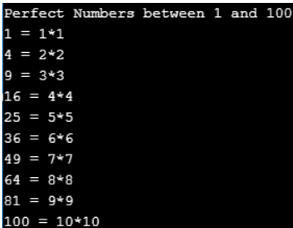Updated March 17, 2023
Introduction to Squares in Java
When a number is multiplied by itself, the resulting number formed is the Square of the Number. Squares of a number are very easy to find. Generally, whenever we find the square root of an Integer number, we only get the result in Integer. Similarly, whenever we find the square of a decimal number, we get the answer in decimal as well. An interesting fact about the square of a number is that whenever we do a square of an integer number, the value of the resulting number increases. However, when we do the square of decimals between 0 and 1, the resulting number decreases. An example would be that of a squaring of 0.5. When we square 0.5, the number gets decreased to 0.25. In this article, we are going to see the various methods of how we can square a number using the Java programming language.
Working – Square of a number can be found out in Java by a variety of techniques. We would like to see some examples related to the square of a number by which we can understand the square of a number better.
How to calculate Square in Java?
Let us learn how to calculate square in java:
Example #1
The simplest way of finding the square of a number is Math.pow(), where it can be used to calculate any power of a number.
Code:
import java.util.*;
public class Square
{
public static void main(String args[])
{
Scanner sc=new Scanner(System.in);
int num;
System.out.print("Enter a number which is integer format: ");
num=sc.nextInt();
System.out.println("The square of "+ num + " is: "+ Math.pow(num, 2));
}
}Output:
Example #2
In the next program, we are going to calculate the square of a number in the usual form such that it multiplies two numbers sequentially and finds the square of the respective number.
Code:
import java.util.*;
public class Square2
{
public static void main(String args[])
{
Scanner sc=new Scanner(System.in);
int no;
System.out.print("Enter a number which is integer format: ");
no=sc.nextInt();
System.out.println("Square of "+ no + " is: "+(no*no));//the number is multiplied with its own
}
}Output:
Example #3
In this example, we are going to check if a number is a perfect square or not. This is a little bit complex program as it checks if a number is a square of another number.
Code:
import java.util.Scanner;
class JavaExample {
static boolean checkPerfectSquare(double x)
{
// finding the square root of given number
double s= Math.sqrt(x);
return ((s - Math.floor(s)) == 0); //Math.floor() is used here to calculate the lower value.
}
public static void main(String[] args)
{
System.out.print("Enter any number:");
Scanner scanner = new Scanner(System.in);
double no= scanner.nextDouble();
scanner.close();
if (checkPerfectSquare(no))
System.out.print(no+ " is a perfect square number");
else
System.out.print(no+ " is not a perfect square number");
}
}Output:
Example #4
In this program, we find the number of square numbers within a specific range. We enter the range of numbers, and the code would produce the square number in that specific range. In the below program, we find the number of square integers between 0 and 100.
Code:
// Finding the range of perfect square numbers in Java programming language
import java.io.IOException;
public class SquareNumbersInRange {
public static void main(String[] args) throws IOException {
int starting_number = 1;
int ending_number = 100;
System.out.println("Perfect Numbers between "+starting_number+ " and "+ending_number);
for (int i = starting_number; i <= ending_number; i++) {
int number = i;
int sqrt = (int) Math.sqrt(number);
if (sqrt * sqrt == number) {
System.out.println(number+ " = "+sqrt+"*"+sqrt);
}
}
}
}Output:
Example #5
In this program, we are going to see the sum of squares of the first N natural numbers. We enter the value of N, and the program calculates the sum of squares of the first N natural numbers.
Code:
// Java Program to find sum of
// square of first n natural numbers
import java.io.*;
class SumofSquares
{
// Return the sum of the square of first n natural numbers
static int square sum(int n)
{
// Move the loop of I from 1 to n
// Finding square and then adding it to 1
int sum = 0;
for (int i = 1; i <= n; i++)
sum += (i * i);
return sum;
}
// Main() used to print the value of sum of squares
public static void main(String args[]) throws IOException
{
int n = 6;
System.out.println("The sum of squares where N value is 6 is "+ squaresum(n));
}
}Output:
Conclusion
- In this article, we see a list of methods by which we can square a number, find whether a number is square or not within a specific range, and the sum of integers of the first N natural numbers. However, there are also some other techniques that can be used to find the square of a number. The name of a technique that can be used to see and check if a number is square or not is the Recursion technique, which uses a function to check if the number is a perfect square.
- Although the recursion technique is difficult to use, it can be used to calculate the square of a number within a few lines of code. Further, using square numbers, we can generate a lot of pattern programs. We can print a square pattern in a spiral format or a zig-zag format. Similarly, the square numbers can be used in the source code to generate the double square, such as the number 16, where the double square is number 2.
Recommended Articles
This is a guide to the Squares in Java. Here we have discussed the Introduction along with Examples and codes with Output of Squares in Java. You can also go through our other suggested articles to learn more–





